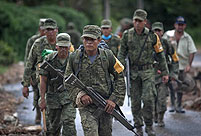BERLIN, Sept. 27 -- German main opponent the Social Democats (SPD) decided on Friday night to start exploratory talks with Chancellor Angela Merkel's conservative bloc before any formal negotiation on forming a coalition government.
The center-left SPD made the decision in a 200-participant closed-door party convention which lasted for around four hours in Berlin on Friday, five days after a federal election, during which Merkel's Christian Democratic Union (CDU) and its Bavarian sister party Christian Social Union (CSU) proved to be the biggest winner with 41.5 percent of votes, a victorious result but not enough to govern alone.
"We are confident in the talks," said SPD chairman Sigmar Gabriel in a press conference after the convention, "Our guidelines are the contents of social democratic politics."
The exploratory talks could take place as early as next week, reported Die Welt newspaper, citing unnamed convention participant.
"We also have no fear of an election if such negotiations fail," said Gabriel.
Peer Steinbrueck, SPD's chancellor candidate whose image was damaged by gaffes and missteps during his campaign, announced in the convention to withdraw from the front row of his party, either in the party or in its parliament group, according to the report of Die Welt.
"My career will come to an orderly end," the former finance minister was quoted as saying, taking the political responsibility for SPD's poor election result of 25.7 percent of votes. Its favored ally the Greens captured 8.4 percent. The Left Party got 8.6 percent of votes.
Merkel said on Monday that she had contacted SPD leadership on a possible coalition, but didn't rule out talks with other potential coalition partners.
"We are, of course, open for talks," she said.
An opinion poll result released by ZDF television on Friday suggested that 58 percent Germans would support a coalition between Merkel's conservatives and the SPD, as during Merkel's first term in 2005-2009.
According to a recent survey by the Forsa pollster, however, a higher share of 65 percent SPD members were against the idea, fearing that the SPD might have to compromise on some issues during its ally with the strong CDU/CSU union, and that the party's popularity might ultimately be damaged.
The SPD sufferred a drop of votes of 11.2 percentage points in 2009 election, four years after it allied with the CDU/CSU union. The Union's current junior partner, the pro-business Free Democratic Party (FDP), crashed out of the parliament with a disappointing result of 4.8 percent.
Gabriel has proposed to hold a referendum among the party's 470,000 members after negotiations on the final decision of whether to form a coalition government with CDU/CSU.
The negotiations are expected to be tough and time consuming, as both sides see differently mainly on various domestic issues, including setting minimum wage and tax increases.
During its election campaign, the SPD stressed greater social justice and reiterated the plan to introduce a national minimum wage of 8.50 euros (11.35 U.S. dollars) per hour. The party also wants to raise taxes on incomes above 100,000 euros to 49 percent from 42 percent.
However, Merkel said such tax hike plans would risk spoiling the good situation in the country. The CDU party rules out tax increases in its campaign and supports minimum wage deals struck by employers and trade unions in different industry sectors and regions.
Before forming their first coalition in 2005, the CDU/CSU and the SPD spent 65 days on tough negotiations.
Senior officials from the CDU has expressed signs of concession in order to form a coalition government with the SPD. Incumbent Finance Minister Wolfgang Schaeuble suggested in an interview on Wednesday that his party might compromise on the issue of tax rises.
"Let's wait and see how the talks go," he said.
 Storms leave 97 dead, 58 missing in Mexico
Storms leave 97 dead, 58 missing in Mexico New model of indigenous surface-to-air missiles testfired
New model of indigenous surface-to-air missiles testfired  118.28-carat diamond to be auctioned in HK
118.28-carat diamond to be auctioned in HK Maternal love under streetlight
Maternal love under streetlight Naked foreign student sits in the middle of a road in Haikou
Naked foreign student sits in the middle of a road in Haikou  Colorful Yunnan: Enjoy the natural beauty
Colorful Yunnan: Enjoy the natural beauty Harbin named Chinese city with most beautiful women
Harbin named Chinese city with most beautiful women New college students' military training in Guangzhou
New college students' military training in Guangzhou Rugby girls
Rugby girls PLA's 38th Group Army conduct training
PLA's 38th Group Army conduct training Residences of the royal house of Savoy
Residences of the royal house of Savoy The last days of Wan Aihua
The last days of Wan Aihua Highlights at 12th National Games of China
Highlights at 12th National Games of China Beijing Film Academy welcomes freshmen
Beijing Film Academy welcomes freshmen Large mahjong party sets new world record
Large mahjong party sets new world recordDay|Week|Month